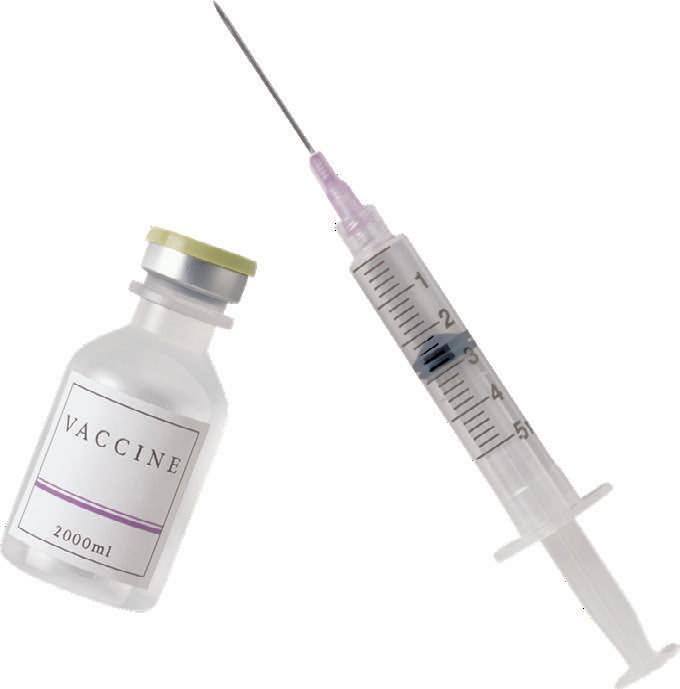
4 minute read
Health Matters
www.drjimshealthtips.com By James W. Jones, MD, PhD, MHA
What is the Causation for Hesitation in Vaccination?
The worldwide Covid scourge has caused more death and despair than any pandemic for over a century…and is continuing with no end in sight. Such goes away only when a large enough percentage of the population are immune and cannot be infected to infect others. The immune proportion necessary is about two-thirds, and just over 50% of Americans have been fully vaccinated. Covid is much more infectious than influenza and 20 times as deadly. Hospitals presently are filled with those suffering. CDC currently estimates over 200,000 are requiring hospital care, and only 3% of those suffering are vaccinated.
Let’s examine the reasoning that triggers hesitation to get the protection the Covid vaccine delivers. There is a strong relationship between social media output and Covid vaccine hesitancy. The belief initially was that the vaccine was being rushed, because the FDA did not give full approval until August 23, 2021. The Emergency Use Authorization was approved on December 11, 2020, and widespread vaccinations were begun starting with vulnerable populations. This emergency approval was after several phases of testing were completed. First, healthy people were injected,
Monday - Saturday 10 am - 7 pm Sunday 11 am - 6 pm



with monitoring of side effects and certainty that sufficient protective antibodies were produced. Next, hundreds were selected based on age and ethnicity and vaccinated.
This brought up concern that it was unsafe. Upon Emergency Approval, Acting FDA Commissioner Janet Woodcock, M.D. said “The public can be very confident that this vaccine meets the high standards for safety, effectiveness, and manufacturing quality the FDA requires of an approved product.” Perhaps doubters have considered that this is the first vaccine to use the genetic system to make us immune. After all, our genes put together our bodies and will allow future generations to exist. The possibility modifications could occur is concerning. The vaccine places messenger RNA into the muscle cells where injected, and it instructs their RNA to make a viral protein which stimulates the bodies’ immune cells. People who don’t understand our genetic system’s workings could easily conclude that they don’t want their genes altered, and thus hesitate to be injected. Our cells have two major sections: the nucleus and the rest of the cell, composed mainly of cytoplasm. The mastermind DNA resides in the nucleus and the RNA in the cytoplasm. The DNA tells the RNA what molecules to make. DNA does this by making and sending messenger RNA. Messenger molecules cannot do anything else. They are errand molecules. They also are eliminated when their messages are processed. Those opposed to vaccination on a genetic bias frequently consider the erroneous conclusion that vaccines can cause autism and other genetic defects. This has been misinterpreted, because most vaccines in infants are given at 12 months of age, when the signs of autism first appear. It is just a false correlation. There have been a few of those vaccinated that have had severe initial reactions, but in the studies, an equal number of participants were injected with harmless placebos…and an equal number had of these had reactions. Bias is an often present source of human error that is particularly concentrated in the Covid Vaccine refusal debacle. One can choose to disregard facts that disagree with their preferred conclusions. The riskbenefit ratio is overwhelmingly in favor of getting vaccinated. The decision to be vaccinated is very important indeed, because it can potentially save your life or health, and that of your loved ones. Choose wisely.
From the Mouths of Babes...
My 6 year old son asked, “Dad, can we get a cat?” Me: “Your Mom is allergic to cats, so no.” My Son: “When Mom dies can we get a cat?”
Me: “Sure.”
I was on the phone with my wife discussing dinner plans when my 7-yearold informed us that, “Salad is ruining my life.”

My son just turned two and is barely saying complete words. On Halloween, we took him trick-or-treating and, when someone would hold out their hand with candy, he would inspect it. If he didn’t care for what the candy was, he would look up and say, “No thank you,” then start toward the next house. It was hilarious.

When I was a little kid, I had to pee in a cup at the doctor’s office. It was my first time doing it, so my mom helped me. After I finished, I looked at her and said, “I don’t have to drink it, do I?”
My father was driving with his granddaughter in the back seat. At one point, she said, “How old are you, Granddad?” “59,” he replied. “Oh, so next year you’ll be 60?” “Yes.” “And after that, you’ll be dead.” Then she just kind of shrugged her shoulders and looked out of the window.




